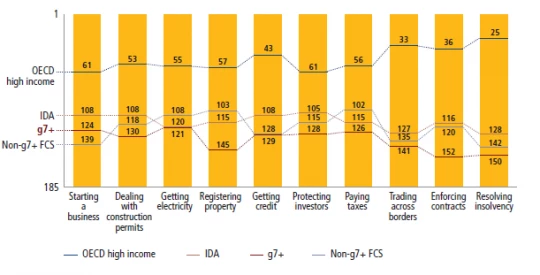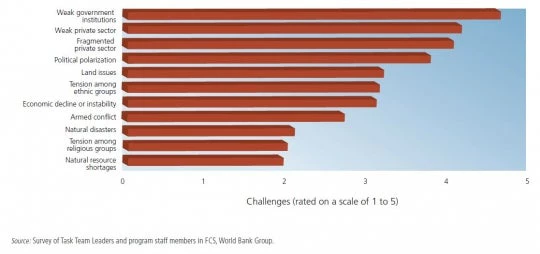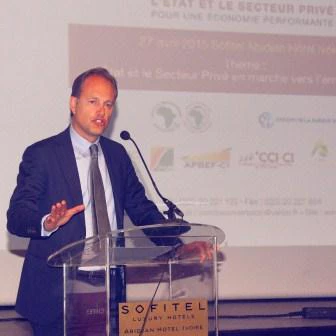Private sector development (PSD) plays a crucial role in post-conflict economic development and poverty alleviation. Fragile states, however, face major challenges, such as difficult access to finance, power and markets; poor infrastructure; high levels of corruption; and a lack of transparency in the regulatory environment.
The private sector has demonstrated its resilience in the face of conflict and fragility, operating at the informal level and delivering services that are traditionally the mandate of public institutions. However, in post-conflict situations, PSD can have predatory aspects, thriving on the institutional and regulatory vacuum that prevails. The private sector will need to create 90 percent of jobs worldwide to meet the international community’s antipoverty goals, so pro-poor and pro-growth strategies need to focus on strengthening the positive aspects of PSD, even while tackling its negative aspects.
Promoting a dynamic investment climate is one such positive strategy. Well-designed interventions, like those implemented by the World Bank Group and other development institutions, aim to improve the business environment as a whole in order to boost local and foreign investment, and eventually to stimulate growth and generate employment.
Most fragile states and post-conflict economies — the majority of which are found in Sub-Saharan Africa — are at the bottom of the World Bank’s Doing Business rankings (see Figure 1). Improving the business environment by easing the conditions of doing business can bolster formal private-sector activities, state authority and service delivery. Increased economic activity and sustainable investment can, in turn, boost state revenue through taxation. It can also enhance the private sector’s credibility with citizens.
Figure 1. On average, g7+ and FCS economies rank in the bottom third in all areas measured by Doing Business .

Jane Nelson of Harvard University suggests that, in fragile states and post-conflict economies, there is often deep mistrust between the government and the private sector, resulting from widespread rent-seeking behaviors, cronyism and lack of legitimacy. To overcome these shortcomings and to strengthen public trust, engaging the private sector in a reform dialogue is essential. To this end, public-private dialogue (PPD) mechanisms have proven to be effective instruments, especially in fragile and conflict-affected states (FCS).
Public Private Dialogue in Fragile States
Michael Porter of Harvard Business School argues that government “regulation is necessary for well-functioning markets and that the right kind of regulation can actually foster economic value creation.” However, that assertion assumes that effective regulations are in place. Badly designed regulatory frameworks, especially those that lack the private sector’s input, can have adverse effects, hindering investments, economic growth and job creation.
PPD is a structured engagement mechanism that aims to assemble all relevant stakeholders in a balanced and inclusive manner. The goal is to assess and prioritize issues and ultimately to achieve positive, sustainable results, all through a convening platform that’s enabled by trust.
According to a recent World Bank Group report on PPD in fragile states, PPD is vital in compensating for the lack of legitimate institutions in FCS, in helping create transparency and trust among stakeholders, and in identifying the need for reforms and interventions that can improve the business environment and attract investment.
So: What are the main impediments to achieving PPD objectives in fragile states? The key factors are weak government institutions and fragmentation within the private sector (see Figure 2).
Figure 2. Challenges to achieving PPD objectives in fragile states

Such findings have led development agencies to focus on building institutional capacity and supporting public-public and private-private dialogues before bringing all relevant stakeholders together. The World Bank Group, for example, advises and supports PPD processes at three levels:
PPD in action
The Nepal Business Forum (NBF), an economy-wide form of PPD, is helping address key drivers of PSD and is helping improve market opportunities. To date, three reforms in the tax, export credit and hydropower sectors have generated $8 million in private-sector savings. The NBF is expected to generate $10 million in private-sector savings through its support for reforms. The forum has been instrumental in creating a culture of dialogue between the public and private sectors. It has also been crucial in building trust among stakeholders during a post-conflict period that is marred by political instability.
Another example of how PPD can enhance the business environment for private-sector growth is the Liberia Better Business Forum (LBBF). Reforms so far have yielded $4.7 million in private-sector savings; created 20,400 new jobs; increased business registrations by 20 percent; and attracted $13 million in private-sector investment.

PPD mechanisms have demonstrated that they are effective platforms for enabling trust and rebuilding confidence in post-conflict environments. They give all relevant stakeholders a way to work jointly and transparently on identifying PSD constraints and creating sustainable policy reform solutions.
It’s certainly not a piece of cake, but it’s a key ingredient of the recipe.
The private sector has demonstrated its resilience in the face of conflict and fragility, operating at the informal level and delivering services that are traditionally the mandate of public institutions. However, in post-conflict situations, PSD can have predatory aspects, thriving on the institutional and regulatory vacuum that prevails. The private sector will need to create 90 percent of jobs worldwide to meet the international community’s antipoverty goals, so pro-poor and pro-growth strategies need to focus on strengthening the positive aspects of PSD, even while tackling its negative aspects.
Promoting a dynamic investment climate is one such positive strategy. Well-designed interventions, like those implemented by the World Bank Group and other development institutions, aim to improve the business environment as a whole in order to boost local and foreign investment, and eventually to stimulate growth and generate employment.
Most fragile states and post-conflict economies — the majority of which are found in Sub-Saharan Africa — are at the bottom of the World Bank’s Doing Business rankings (see Figure 1). Improving the business environment by easing the conditions of doing business can bolster formal private-sector activities, state authority and service delivery. Increased economic activity and sustainable investment can, in turn, boost state revenue through taxation. It can also enhance the private sector’s credibility with citizens.
Figure 1. On average, g7+ and FCS economies rank in the bottom third in all areas measured by Doing Business .

Jane Nelson of Harvard University suggests that, in fragile states and post-conflict economies, there is often deep mistrust between the government and the private sector, resulting from widespread rent-seeking behaviors, cronyism and lack of legitimacy. To overcome these shortcomings and to strengthen public trust, engaging the private sector in a reform dialogue is essential. To this end, public-private dialogue (PPD) mechanisms have proven to be effective instruments, especially in fragile and conflict-affected states (FCS).
Public Private Dialogue in Fragile States
Michael Porter of Harvard Business School argues that government “regulation is necessary for well-functioning markets and that the right kind of regulation can actually foster economic value creation.” However, that assertion assumes that effective regulations are in place. Badly designed regulatory frameworks, especially those that lack the private sector’s input, can have adverse effects, hindering investments, economic growth and job creation.
PPD is a structured engagement mechanism that aims to assemble all relevant stakeholders in a balanced and inclusive manner. The goal is to assess and prioritize issues and ultimately to achieve positive, sustainable results, all through a convening platform that’s enabled by trust.
According to a recent World Bank Group report on PPD in fragile states, PPD is vital in compensating for the lack of legitimate institutions in FCS, in helping create transparency and trust among stakeholders, and in identifying the need for reforms and interventions that can improve the business environment and attract investment.
So: What are the main impediments to achieving PPD objectives in fragile states? The key factors are weak government institutions and fragmentation within the private sector (see Figure 2).
Figure 2. Challenges to achieving PPD objectives in fragile states

Such findings have led development agencies to focus on building institutional capacity and supporting public-public and private-private dialogues before bringing all relevant stakeholders together. The World Bank Group, for example, advises and supports PPD processes at three levels:
- PPD for Economy-Wide Engagement: Large-scale, economy-wide interventions are used to establish a sustainable platform for a broader dialogue on reform and development agendas. These are most often used in low-income countries, especially in FCS, where they can be the initial, and sometimes primary, point of engagement.
- Sector-Specific PPD: Sector-specific PPDs provide an integrated response to factors that constrain sectors’ growth. Studies show that industry-centered PPD can be especially helpful in improving competitiveness, and that it can provide a valuable platform for collaboration along the supply chain and across governments, businesses and communities. Sector-specific PPDs can also be implemented at a subnational or regional level.
- Stakeholder Mobilization: Short-term, "light" PPD is often used to deliver project objectives and goals. Such interventions are designed to support PPD initiatives that help strengthen a weak private sector, facilitate dialogue among private-sector stakeholders, and increase outreach to civil society or disengaged communities.
PPD in action
The Nepal Business Forum (NBF), an economy-wide form of PPD, is helping address key drivers of PSD and is helping improve market opportunities. To date, three reforms in the tax, export credit and hydropower sectors have generated $8 million in private-sector savings. The NBF is expected to generate $10 million in private-sector savings through its support for reforms. The forum has been instrumental in creating a culture of dialogue between the public and private sectors. It has also been crucial in building trust among stakeholders during a post-conflict period that is marred by political instability.
Another example of how PPD can enhance the business environment for private-sector growth is the Liberia Better Business Forum (LBBF). Reforms so far have yielded $4.7 million in private-sector savings; created 20,400 new jobs; increased business registrations by 20 percent; and attracted $13 million in private-sector investment.

PPD mechanisms have demonstrated that they are effective platforms for enabling trust and rebuilding confidence in post-conflict environments. They give all relevant stakeholders a way to work jointly and transparently on identifying PSD constraints and creating sustainable policy reform solutions.
It’s certainly not a piece of cake, but it’s a key ingredient of the recipe.


Join the Conversation